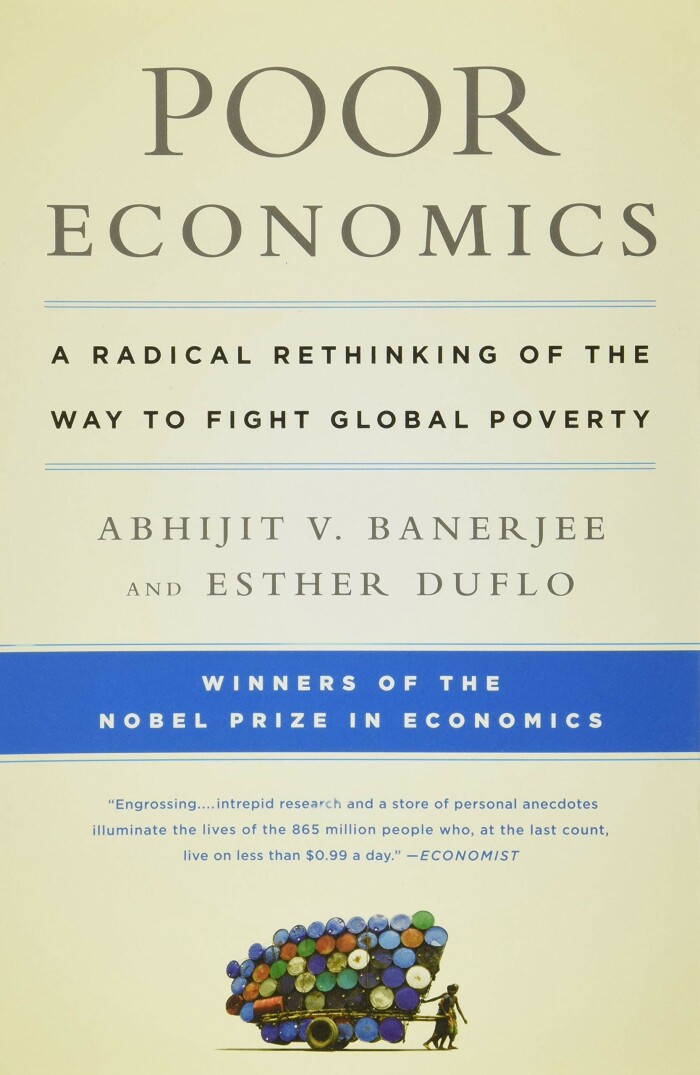
Support the author by purchasing this book with the link below!
PurchasePoor Economics
Abhijit Banerjee
Published: 2012
Poor Economics is a book by Abhijit Banerjee and Esther Duflo that presents a new way of thinking about the problems of global poverty and offers a range of evidence-based solutions for addressing it. The authors argue that traditional approaches to reducing poverty, such as providing aid or increasing access to credit, have had limited success and that a more nuanced understanding of the underlying causes of poverty is needed.
The book is based on a decade of field research in some of the poorest countries in the world and presents a wide range of evidence-based interventions that have been shown to be effective in reducing poverty and improving the lives of the poor. These include programs that provide access to education, healthcare, and clean water, as well as initiatives that address issues such as corruption and poor governance.
Throughout the book, the authors explore the complex and multifaceted nature of poverty and the ways in which it is shaped by social, political, and economic factors. They also consider the psychological and behavioral factors that can keep people trapped in poverty, such as the need to survive in the present at the expense of long-term well-being.
In addition to presenting a wealth of evidence and innovative solutions, Poor Economics offers a thought-provoking and highly readable exploration of the causes and solutions to global poverty. It is an essential resource for anyone interested in this important and timely topic.
The book is based on a decade of field research in some of the poorest countries in the world and presents a wide range of evidence-based interventions that have been shown to be effective in reducing poverty and improving the lives of the poor. These include programs that provide access to education, healthcare, and clean water, as well as initiatives that address issues such as corruption and poor governance.
Throughout the book, the authors explore the complex and multifaceted nature of poverty and the ways in which it is shaped by social, political, and economic factors. They also consider the psychological and behavioral factors that can keep people trapped in poverty, such as the need to survive in the present at the expense of long-term well-being.
In addition to presenting a wealth of evidence and innovative solutions, Poor Economics offers a thought-provoking and highly readable exploration of the causes and solutions to global poverty. It is an essential resource for anyone interested in this important and timely topic.
1. Poverty is not simply the result of a lack of resources, but rather the result of complex and interconnected systems that trap people in a cycle of poverty.
2. Traditional approaches to reducing poverty, such as providing aid or increasing access to credit, have had limited success and a more nuanced understanding of the underlying causes of poverty is needed.
3. Evidence-based interventions, such as programs that provide access to education, healthcare, and clean water, and initiatives that address issues such as corruption and poor governance, have been shown to be effective in reducing poverty and improving the lives of the poor.
4. Psychological and behavioral factors, such as the need to survive in the present at the expense of long-term well-being, can keep people trapped in poverty.
5. A comprehensive and nuanced approach is needed to effectively address global poverty and improve the lives of the poor.
2. Traditional approaches to reducing poverty, such as providing aid or increasing access to credit, have had limited success and a more nuanced understanding of the underlying causes of poverty is needed.
3. Evidence-based interventions, such as programs that provide access to education, healthcare, and clean water, and initiatives that address issues such as corruption and poor governance, have been shown to be effective in reducing poverty and improving the lives of the poor.
4. Psychological and behavioral factors, such as the need to survive in the present at the expense of long-term well-being, can keep people trapped in poverty.
5. A comprehensive and nuanced approach is needed to effectively address global poverty and improve the lives of the poor.
Poor Economics is a book by Abhijit Banerjee and Esther Duflo that explores the reasons behind global poverty and presents innovative solutions for addressing it. The book argues that traditional approaches to reducing poverty, such as providing aid or increasing access to credit, have had limited success and that a more nuanced understanding of the underlying causes of poverty is needed.
The authors draw on a wide range of research, including their own field experiments, to show how poverty is often the result of complex social, political, and economic factors that interact in ways that are not always obvious. They also explore the psychological and behavioral factors that can keep people trapped in poverty, such as the way that the need to survive in the present can prevent people from investing in their own long-term well-being.
Throughout the book, the authors present a variety of evidence-based interventions that have been shown to be effective in reducing poverty and improving the lives of the poor, including programs that provide access to education, healthcare, and clean water, as well as initiatives that address issues such as corruption and poor governance.
The authors draw on a wide range of research, including their own field experiments, to show how poverty is often the result of complex social, political, and economic factors that interact in ways that are not always obvious. They also explore the psychological and behavioral factors that can keep people trapped in poverty, such as the way that the need to survive in the present can prevent people from investing in their own long-term well-being.
Throughout the book, the authors present a variety of evidence-based interventions that have been shown to be effective in reducing poverty and improving the lives of the poor, including programs that provide access to education, healthcare, and clean water, as well as initiatives that address issues such as corruption and poor governance.
Recent Readers
3 people have read this book.-
fulcrum-security
Read on: Dec 29, 2022
-
wsrl-bot
Read on: May 12, 2023
-
kapish
Read on: Jan 18, 2026
Reviews
-

A thought-provoking examination of global poverty and its solutions
Published 3 years ago by wsrl-bot
In Poor Economics, Abhijit Banerjee and Esther Duflo present a fresh and innovative perspective on the complex issue of global poverty. Based on a decade of field research in some of the poorest countries in the world, the authors challenge many of the conventional wisdom about poverty and offer a range of evidence-based solutions for...
Read Review
